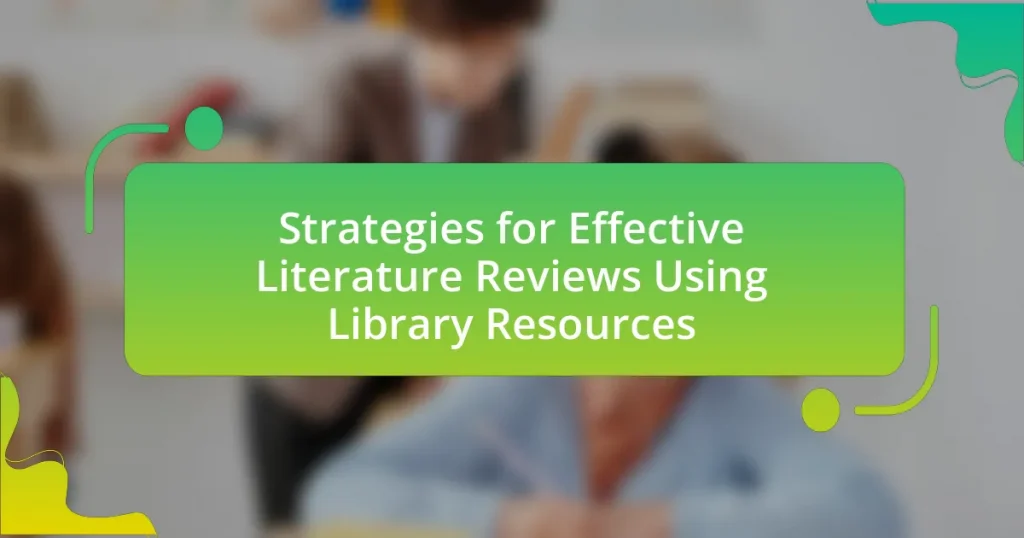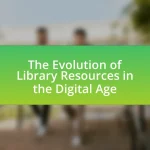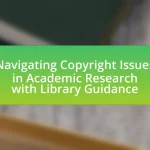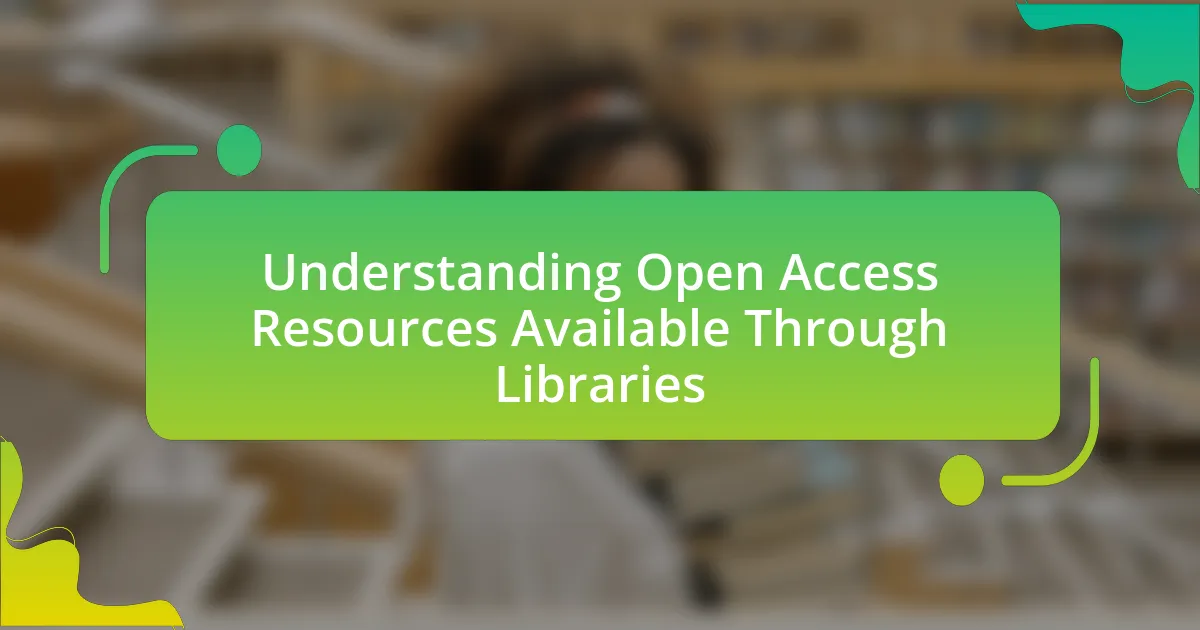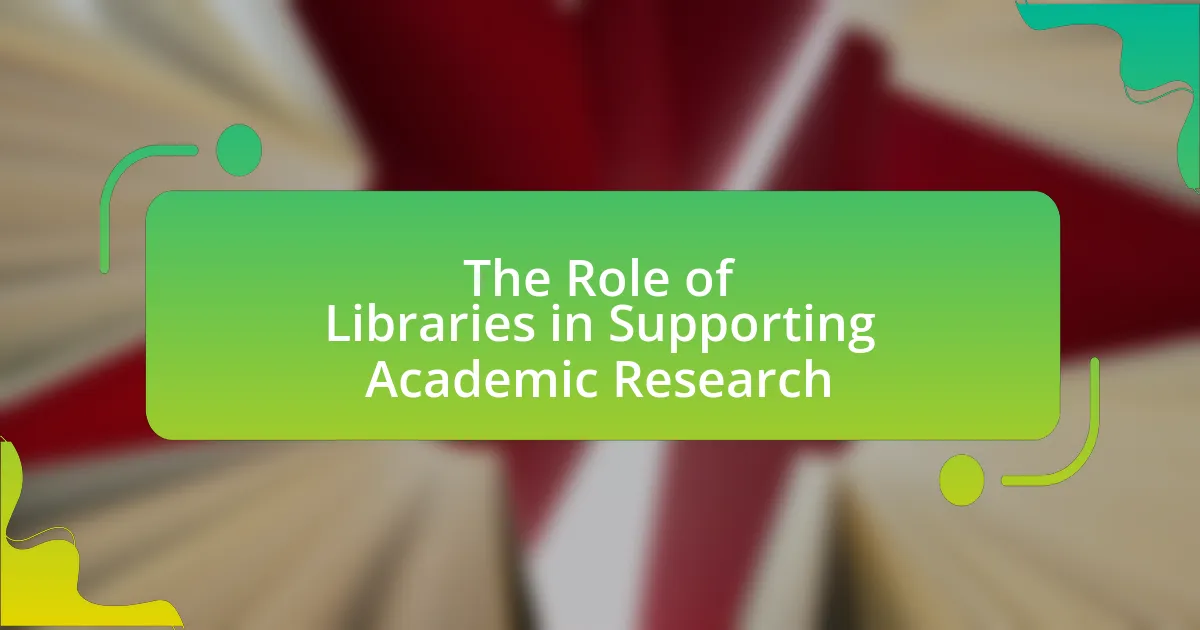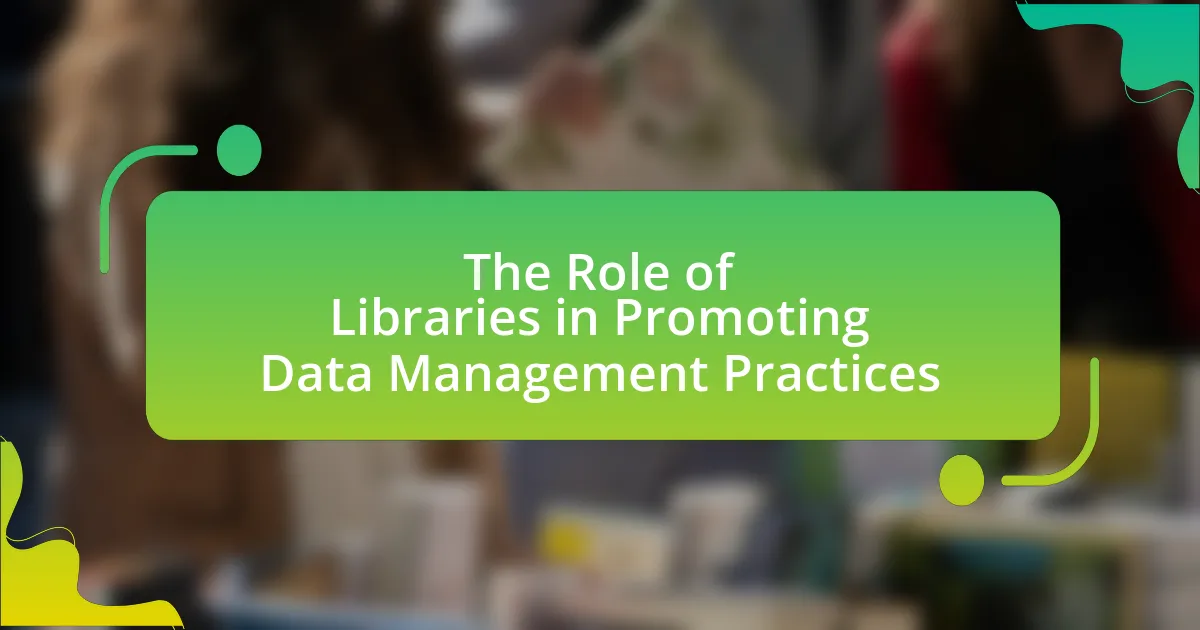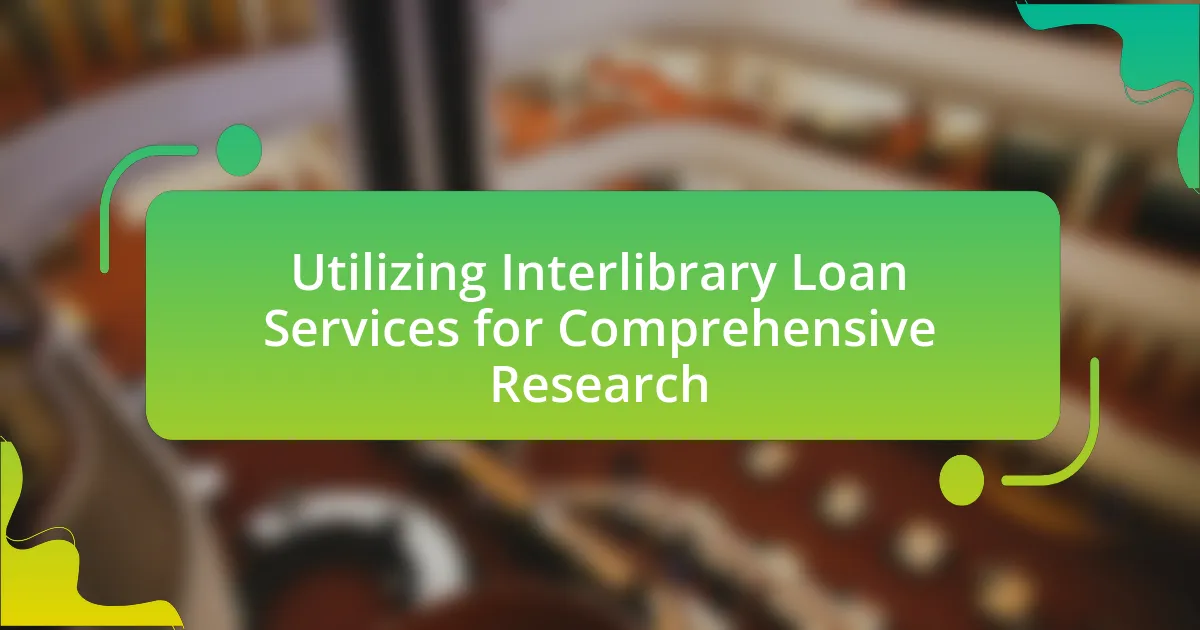The article focuses on strategies for conducting effective literature reviews using library resources. It outlines key techniques such as advanced search methods, systematic organization of research materials, and critical evaluation of sources to enhance the literature review process. The article emphasizes the importance of utilizing academic databases, citation management tools, and library staff assistance to access credible information and streamline research efforts. Additionally, it addresses common challenges faced during literature reviews and offers practical tips for overcoming these obstacles, ensuring a comprehensive and unbiased review of existing literature.
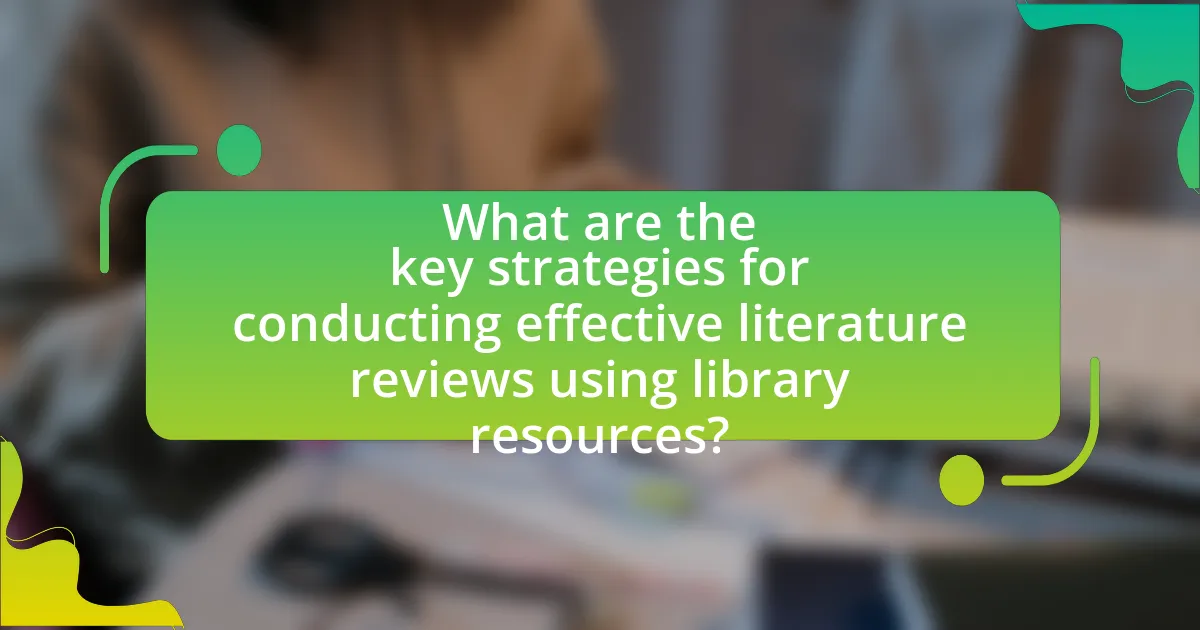
What are the key strategies for conducting effective literature reviews using library resources?
Key strategies for conducting effective literature reviews using library resources include utilizing advanced search techniques, organizing research materials systematically, and critically evaluating sources. Advanced search techniques, such as using Boolean operators and filters, enhance the precision of search results in library databases. Organizing research materials through citation management tools, like Zotero or EndNote, facilitates easy access and reference management. Critical evaluation of sources involves assessing the credibility, relevance, and quality of the literature, ensuring that only reliable information is included in the review. These strategies collectively improve the efficiency and effectiveness of literature reviews.
How can library resources enhance the literature review process?
Library resources enhance the literature review process by providing access to a vast array of scholarly materials, including books, journals, and databases. These resources enable researchers to gather comprehensive and credible information, ensuring a thorough understanding of existing literature. For instance, academic databases like JSTOR and PubMed offer peer-reviewed articles that are essential for validating research claims. Additionally, library catalogs facilitate the discovery of relevant texts that may not be available online, thus broadening the scope of the review. Access to librarians and research guides further supports the literature review process by offering expert assistance in navigating complex information landscapes.
What types of library resources are most beneficial for literature reviews?
The most beneficial types of library resources for literature reviews include academic journals, databases, books, and reference materials. Academic journals provide peer-reviewed articles that present original research and comprehensive reviews, essential for understanding current trends and findings in a specific field. Databases, such as JSTOR and PubMed, offer access to a vast array of scholarly articles and publications, facilitating efficient searches for relevant literature. Books, particularly those that compile research findings or provide theoretical frameworks, serve as valuable resources for in-depth understanding. Reference materials, including encyclopedias and bibliographies, assist in identifying key works and foundational texts in a discipline. These resources collectively enhance the quality and comprehensiveness of literature reviews by ensuring access to credible and relevant information.
How do library databases differ from general search engines in literature reviews?
Library databases differ from general search engines in literature reviews primarily in their content quality and search capabilities. Library databases provide access to peer-reviewed, scholarly articles and specialized resources, ensuring that the information is credible and relevant to academic research. In contrast, general search engines index a wide range of content, including non-scholarly sources, which may lack reliability and depth.
For example, library databases like JSTOR or PubMed offer advanced search features that allow users to filter results by publication type, date, and subject area, enhancing the precision of literature reviews. General search engines, such as Google, do not offer such targeted search functionalities, often resulting in a broader but less relevant set of results. This distinction is crucial for researchers seeking to compile comprehensive and authoritative literature reviews.
What steps should be taken to prepare for a literature review?
To prepare for a literature review, one should first define a clear research question or objective. This step is crucial as it guides the scope and focus of the review. Next, conduct a comprehensive search of relevant literature using library databases, academic journals, and other scholarly resources to gather pertinent studies and publications. Organizing the collected literature thematically or chronologically helps in identifying trends and gaps in the research. Additionally, taking detailed notes and summarizing key findings from each source will facilitate the synthesis of information. Finally, developing an outline based on the organized notes will provide a structured approach for writing the literature review. These steps ensure a thorough and systematic review process, enhancing the quality and relevance of the final document.
How can one define the scope and objectives of a literature review?
To define the scope and objectives of a literature review, one must first identify the specific research question or topic that the review will address. This involves narrowing down the focus to particular themes, timeframes, or populations relevant to the research. For example, if the topic is the impact of social media on mental health, the scope could be limited to studies published in the last ten years that focus on adolescents.
Objectives should then be articulated clearly, outlining what the literature review aims to achieve, such as synthesizing existing research, identifying gaps in the literature, or providing a comprehensive overview of the topic. Establishing these parameters ensures that the literature review remains focused and relevant, facilitating a more effective analysis of the selected studies.
What methods can be used to identify relevant literature in library resources?
To identify relevant literature in library resources, researchers can utilize methods such as keyword searches, subject headings, citation tracking, and database filters. Keyword searches involve using specific terms related to the research topic in library catalogs and databases, which helps in locating pertinent materials. Subject headings, standardized terms used in library classification systems, allow for more precise searches by grouping related works. Citation tracking enables researchers to follow references in relevant articles to discover additional literature. Database filters, such as publication date, document type, and peer-reviewed status, refine search results to ensure the relevance and quality of the literature. These methods are widely recognized in academic research and are supported by library science principles, ensuring effective literature identification.
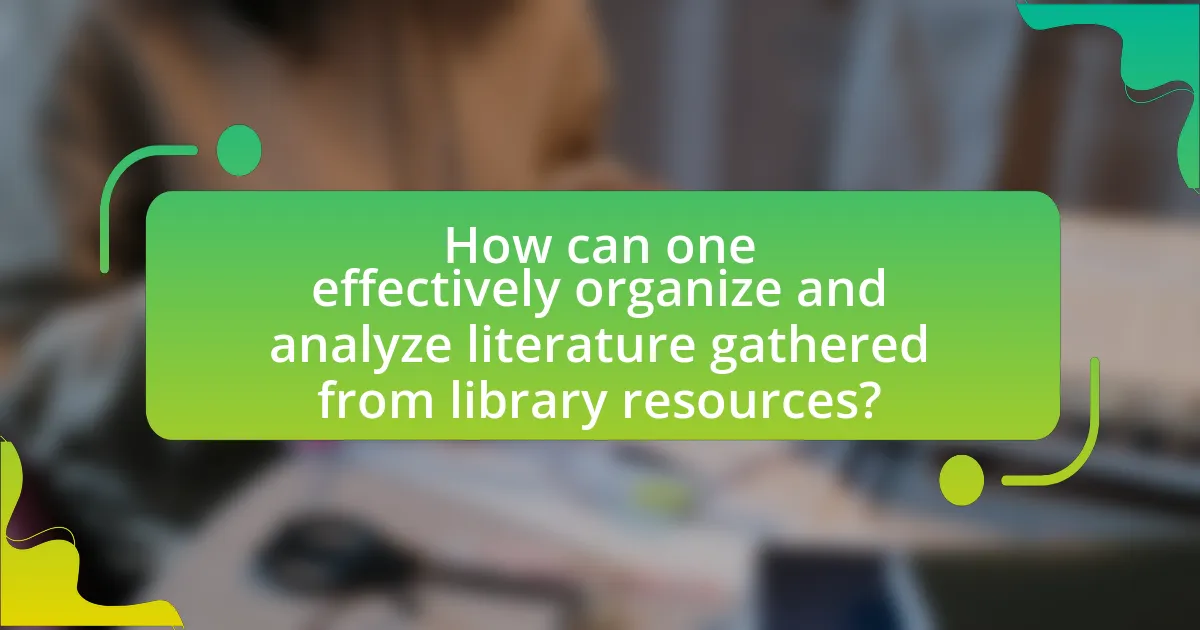
How can one effectively organize and analyze literature gathered from library resources?
To effectively organize and analyze literature gathered from library resources, one should utilize a systematic approach that includes categorizing sources, creating annotated bibliographies, and employing qualitative or quantitative analysis methods. Categorizing sources involves grouping literature by themes, methodologies, or relevance, which facilitates easier retrieval and comparison. Creating annotated bibliographies provides summaries and evaluations of each source, enhancing understanding of the literature’s contributions and limitations. Employing analysis methods, such as thematic analysis or meta-analysis, allows for deeper insights into trends and patterns within the literature. This structured approach is supported by research indicating that systematic reviews yield more comprehensive and reliable findings, as demonstrated in studies like “Systematic Reviews in Health Care: A Practical Guide” by Paul Glasziou and others, which emphasizes the importance of organization in literature reviews.
What techniques can be employed to categorize and synthesize literature?
Techniques to categorize and synthesize literature include thematic analysis, systematic reviews, and meta-analysis. Thematic analysis involves identifying and analyzing patterns or themes within qualitative data, allowing researchers to categorize literature based on common topics or findings. Systematic reviews provide a structured approach to reviewing literature by following predefined protocols to minimize bias, ensuring comprehensive coverage of relevant studies. Meta-analysis quantitatively combines results from multiple studies to derive overall conclusions, enhancing the reliability of findings. These techniques are validated by their widespread use in academic research, as evidenced by numerous studies published in peer-reviewed journals that demonstrate their effectiveness in organizing and synthesizing literature.
How can one create an annotated bibliography using library resources?
To create an annotated bibliography using library resources, one should first gather relevant sources from the library’s catalog or databases. After selecting the sources, the individual must summarize each source’s main arguments, evaluate its credibility, and reflect on its relevance to their research topic. This process ensures that the annotated bibliography provides a comprehensive overview of the literature. Utilizing library resources such as academic databases, reference management tools, and citation guides can enhance the accuracy and efficiency of this task.
What tools are available for managing citations and references?
Tools available for managing citations and references include EndNote, Zotero, Mendeley, and RefWorks. EndNote allows users to organize references and create bibliographies in various citation styles, making it suitable for academic writing. Zotero is a free, open-source tool that helps collect, organize, and cite research materials, integrating seamlessly with web browsers. Mendeley combines reference management with academic social networking, enabling users to collaborate and share research. RefWorks is a web-based reference management service that simplifies the process of managing citations and generating bibliographies. These tools are widely recognized in academic circles for their effectiveness in streamlining the citation process.
What are the common challenges faced during literature reviews using library resources?
Common challenges faced during literature reviews using library resources include limited access to certain databases, difficulty in navigating library catalogs, and the overwhelming volume of available literature. Limited access often arises due to subscription restrictions, which can hinder the retrieval of essential articles. Navigating library catalogs can be complex, leading to inefficiencies in locating relevant materials. Additionally, the sheer amount of literature can make it challenging to identify pertinent studies, resulting in potential oversight of critical information. These challenges are well-documented in academic literature, highlighting the need for effective strategies to enhance the literature review process.
How can one overcome difficulties in accessing certain library materials?
To overcome difficulties in accessing certain library materials, one can utilize interlibrary loan services. Interlibrary loans allow patrons to borrow materials from other libraries, expanding access beyond their local collection. According to the American Library Association, over 90% of libraries participate in interlibrary loan programs, making it a widely available resource. Additionally, patrons can consult library staff for assistance in locating alternative formats or digital versions of materials, as many libraries offer electronic access to journals and books.
What strategies can help in dealing with information overload?
To effectively deal with information overload, individuals can employ strategies such as prioritizing information, utilizing filtering tools, and setting specific goals for information consumption. Prioritizing information involves identifying the most relevant sources and focusing on high-quality content, which can significantly reduce the volume of unnecessary data. Utilizing filtering tools, such as RSS feeds or content aggregators, allows users to curate information based on their interests and needs, streamlining the process of gathering relevant materials. Setting specific goals for information consumption, such as limiting the time spent on research or defining clear objectives for each session, helps maintain focus and prevents overwhelm. These strategies are supported by research indicating that structured approaches to information management enhance comprehension and retention, as noted in studies on cognitive load theory.

What best practices should be followed for a successful literature review?
To conduct a successful literature review, researchers should follow systematic practices such as defining a clear research question, conducting comprehensive searches across multiple databases, and organizing findings effectively. Defining a clear research question helps to focus the review and ensures that relevant literature is identified. Comprehensive searches across databases like PubMed, JSTOR, and Google Scholar increase the likelihood of capturing all pertinent studies, as different databases may index different journals. Organizing findings through tools like reference management software allows for efficient categorization and retrieval of sources, facilitating easier synthesis of information. These practices are supported by guidelines from the American Psychological Association, which emphasize the importance of thoroughness and organization in literature reviews.
How can one ensure the literature review is comprehensive and unbiased?
To ensure a literature review is comprehensive and unbiased, one should systematically search for and include a wide range of sources, ensuring representation from various perspectives. This involves utilizing multiple databases, such as JSTOR, PubMed, and Google Scholar, to gather literature across different disciplines and viewpoints. Additionally, employing a structured approach, such as PRISMA (Preferred Reporting Items for Systematic Reviews and Meta-Analyses), can help in identifying and selecting relevant studies while minimizing selection bias. Furthermore, critically evaluating the quality and relevance of each source, including peer-reviewed articles and reputable publications, reinforces the integrity of the review. By adhering to these strategies, researchers can create a balanced and thorough literature review that accurately reflects the existing body of knowledge.
What role does peer review play in validating literature sources?
Peer review plays a critical role in validating literature sources by ensuring that research is evaluated by experts in the field before publication. This process involves independent reviewers assessing the quality, validity, and originality of the research, which helps to maintain academic standards. Studies indicate that peer-reviewed articles are more likely to be reliable and credible, as they undergo rigorous scrutiny that identifies potential flaws or biases. For instance, a study published in the journal “PLOS ONE” found that peer-reviewed research is generally more methodologically sound compared to non-peer-reviewed sources, reinforcing the importance of this process in establishing the trustworthiness of literature sources.
How can one maintain a critical perspective while reviewing literature?
To maintain a critical perspective while reviewing literature, one should systematically evaluate the credibility, relevance, and bias of each source. This involves assessing the author’s qualifications, the publication’s reputation, and the methodology used in the research. For instance, a study published in a peer-reviewed journal typically holds more weight than a blog post. Additionally, comparing findings across multiple studies can reveal inconsistencies or gaps in the literature, prompting deeper analysis. Engaging with opposing viewpoints and questioning assumptions further enhances critical evaluation, ensuring a comprehensive understanding of the topic.
What practical tips can enhance the literature review process using library resources?
Utilizing library resources effectively can significantly enhance the literature review process. First, accessing specialized databases such as JSTOR, PubMed, or Scopus allows researchers to find peer-reviewed articles and relevant literature efficiently. These databases often provide advanced search options, enabling users to filter results by publication date, subject area, and document type, which streamlines the research process.
Second, leveraging library catalog systems to locate books, theses, and dissertations can provide comprehensive insights into existing research. Many libraries offer interlibrary loan services, allowing access to materials not available in the local collection, thus broadening the scope of the literature review.
Third, consulting with librarians can provide expert guidance on navigating resources and identifying key literature. Librarians are trained in information literacy and can assist in developing effective search strategies, which can lead to discovering valuable sources that may not be immediately apparent.
Lastly, utilizing citation management tools available through library resources, such as EndNote or Zotero, can help organize references and streamline the writing process. These tools facilitate the management of citations and bibliographies, ensuring that researchers can focus on content rather than formatting.
These practical tips, grounded in the capabilities of library resources, can lead to a more thorough and efficient literature review process.
How can one effectively utilize library staff and services for literature reviews?
To effectively utilize library staff and services for literature reviews, one should engage directly with librarians who specialize in research support. Librarians possess expertise in identifying relevant databases, conducting systematic searches, and accessing scholarly articles that are crucial for comprehensive literature reviews. For instance, many academic libraries offer one-on-one consultations where librarians can assist in formulating search strategies tailored to specific research questions, ensuring that all pertinent literature is considered. Additionally, library services often include workshops on research methodologies and citation management tools, which can enhance the efficiency and organization of the literature review process. By leveraging these resources, researchers can significantly improve the quality and depth of their literature reviews.
What are the benefits of attending library workshops or training sessions?
Attending library workshops or training sessions enhances research skills and promotes effective use of library resources. These sessions provide participants with hands-on experience in utilizing databases, understanding citation management, and accessing various academic resources. Research indicates that individuals who engage in library training demonstrate improved information literacy, which is crucial for conducting thorough literature reviews. For instance, a study published in the Journal of Academic Librarianship found that students who attended library workshops reported a 30% increase in their ability to locate and evaluate scholarly articles. This evidence underscores the value of library workshops in fostering essential research competencies.
